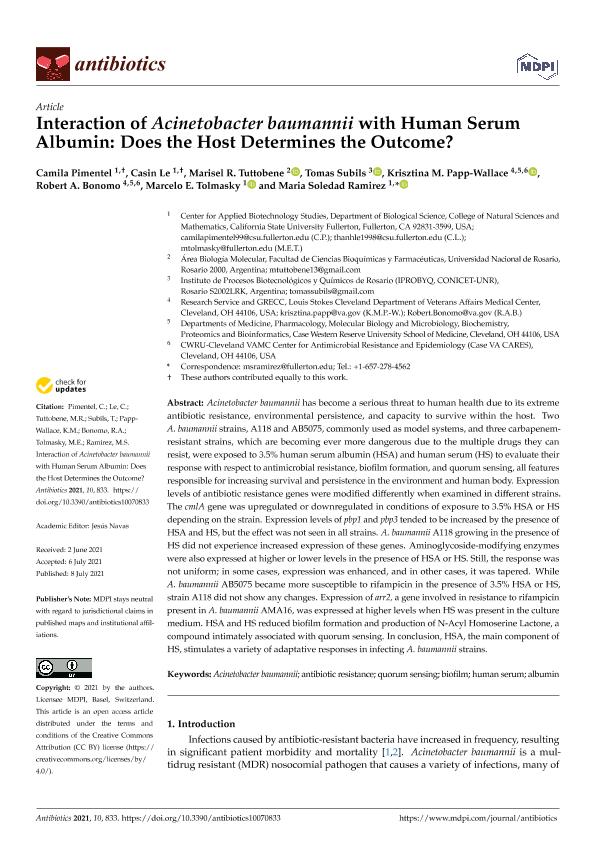Mostrar el registro sencillo del ítem
dc.contributor.author
Pimentel, Camila
dc.contributor.author
Le, Casin
dc.contributor.author
Tuttobene, Marisel Romina

dc.contributor.author
Subils, Tomás

dc.contributor.author
Papp Wallace, Krisztina M.
dc.contributor.author
Bonomo, Robert A.
dc.contributor.author
Tolmasky, Marcelo E.

dc.contributor.author
Ramirez, Maria Soledad
dc.date.available
2022-12-27T18:07:01Z
dc.date.issued
2021-07
dc.identifier.citation
Pimentel, Camila; Le, Casin; Tuttobene, Marisel Romina; Subils, Tomás; Papp Wallace, Krisztina M.; et al.; Interaction of Acinetobacter baumannii with Human Serum Albumin: Does the Host Determine the Outcome?; MDPI AG; Antibiotics; 10; 7; 7-2021; 1-14
dc.identifier.issn
2079-6382
dc.identifier.uri
http://hdl.handle.net/11336/182588
dc.description.abstract
Acinetobacter baumannii has become a serious threat to human health due to its extreme antibiotic resistance, environmental persistence, and capacity to survive within the host. Two A. baumannii strains, A118 and AB5075, commonly used as model systems, and three carbapenem-resistant strains, which are becoming ever more dangerous due to the multiple drugs they can resist, were exposed to 3.5% human serum albumin (HSA) and human serum (HS) to evaluate their response with respect to antimicrobial resistance, biofilm formation, and quorum sensing, all features responsible for increasing survival and persistence in the environment and human body. Expression levels of antibiotic resistance genes were modified differently when examined in different strains. The cmlA gene was upregulated or downregulated in conditions of exposure to 3.5% HSA or HS depending on the strain. Expression levels of pbp1 and pbp3 tended to be increased by the presence of HSA and HS, but the effect was not seen in all strains. A. baumannii A118 growing in the presence of HS did not experience increased expression of these genes. Aminoglycoside-modifying enzymes were also expressed at higher or lower levels in the presence of HSA or HS. Still, the response was not uniform; in some cases, expression was enhanced, and in other cases, it was tapered. While A. baumannii AB5075 became more susceptible to rifampicin in the presence of 3.5% HSA or HS, strain A118 did not show any changes. Expression of arr2, a gene involved in resistance to rifampicin present in A. baumannii AMA16, was expressed at higher levels when HS was present in the culture medium. HSA and HS reduced biofilm formation and production of N-Acyl Homoserine Lactone, a compound intimately associated with quorum sensing. In conclusion, HSA, the main component of HS, stimulates a variety of adaptative responses in infecting A. baumannii strains.
dc.format
application/pdf
dc.language.iso
eng
dc.publisher
MDPI AG
dc.rights
info:eu-repo/semantics/openAccess
dc.rights.uri
https://creativecommons.org/licenses/by/2.5/ar/
dc.subject
ACINETOBACTER BAUMANNII
dc.subject
ALBUMIN
dc.subject
ANTIBIOTIC RESISTANCE
dc.subject
BIOFILM
dc.subject
HUMAN SERUM
dc.subject
QUORUM SENSING
dc.subject.classification
Biología Celular, Microbiología

dc.subject.classification
Ciencias Biológicas

dc.subject.classification
CIENCIAS NATURALES Y EXACTAS

dc.title
Interaction of Acinetobacter baumannii with Human Serum Albumin: Does the Host Determine the Outcome?
dc.type
info:eu-repo/semantics/article
dc.type
info:ar-repo/semantics/artículo
dc.type
info:eu-repo/semantics/publishedVersion
dc.date.updated
2022-09-19T16:03:32Z
dc.journal.volume
10
dc.journal.number
7
dc.journal.pagination
1-14
dc.journal.pais
Suiza

dc.description.fil
Fil: Pimentel, Camila. University of California; Estados Unidos
dc.description.fil
Fil: Le, Casin. University of California; Estados Unidos
dc.description.fil
Fil: Tuttobene, Marisel Romina. Universidad Nacional de Rosario. Facultad de Ciencias Bioquímicas y Farmacéuticas; Argentina. Consejo Nacional de Investigaciones Científicas y Técnicas. Centro Científico Tecnológico Conicet - Rosario; Argentina
dc.description.fil
Fil: Subils, Tomás. Consejo Nacional de Investigaciones Científicas y Técnicas. Centro Científico Tecnológico Conicet - Rosario. Instituto de Procesos Biotecnológicos y Químicos Rosario. Universidad Nacional de Rosario. Facultad de Ciencias Bioquímicas y Farmacéuticas. Instituto de Procesos Biotecnológicos y Químicos Rosario; Argentina
dc.description.fil
Fil: Papp Wallace, Krisztina M.. Case Western Reserve University School of Medicine; Estados Unidos
dc.description.fil
Fil: Bonomo, Robert A.. Case Western Reserve University School of Medicine; Estados Unidos
dc.description.fil
Fil: Tolmasky, Marcelo E.. University of California; Estados Unidos
dc.description.fil
Fil: Ramirez, Maria Soledad. University of California; Estados Unidos
dc.journal.title
Antibiotics
dc.relation.alternativeid
info:eu-repo/semantics/altIdentifier/url/https://www.mdpi.com/2079-6382/10/7/833
dc.relation.alternativeid
info:eu-repo/semantics/altIdentifier/doi/http://dx.doi.org/10.3390/antibiotics10070833
Archivos asociados
